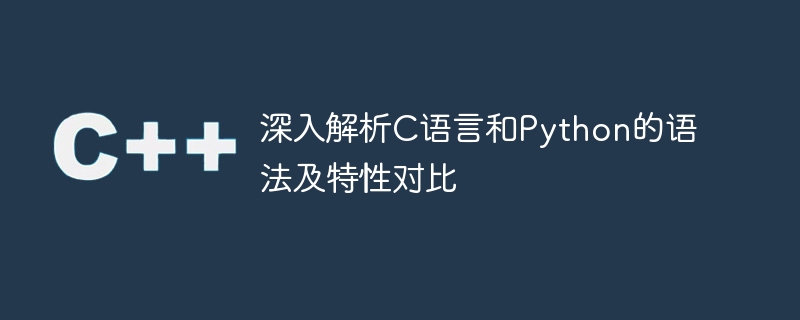

C language and Python are currently two very popular programming languages, each with its own unique syntax and features. This article will provide an in-depth comparison of the syntax and features of the two languages, and illustrate their similarities and differences through concrete code examples.
1. Syntax comparison
In C language, variables must Declare its type before use, for example:
int num = 10;
In Python, variables are dynamically typed, and there is no need to explicitly declare the type, for example:
num = 10
In C language, conditional statements use curly braces {} to represent code blocks, for example :
if (num > 0) { printf("Positive number"); }
In Python, conditional statements use indentation to represent code blocks, for example:
if num > 0: print("Positive number")
In C language, the loop structure uses a for loop or while loop, for example:
for (int i = 0; i < 5; i ) { printf("%d ", i); }
In Python, the loop structure uses a for loop or while loop, for example:
for i in range(5): print(i)
2. Feature comparison
The C language is A procedural programming language that does not directly support object-oriented programming and requires the use of structures and functions to simulate objects. Python is a language that supports object-oriented programming and has object-oriented features such as classes, inheritance, and polymorphism.
In C language, programmers need to manually manage memory allocation and release, which is prone to memory leaks and segfaults. Python uses an automatic garbage collection mechanism, eliminating the need to manually manage memory, reducing the programmer's workload.
Python has a concise and clear syntax, which is highly readable and suitable for rapid development. In comparison, the syntax of C language is relatively cumbersome and requires more code to achieve the same function.
3. Code example
The following is a simple example to show the code differences between C language and Python:
// C language example #includeint sum(int a, int b) { return a b; } int main() { int result = sum(3, 5); printf("Sum: %d ", result); return 0; }
# Python example def sum(a, b): return a b result = sum(3, 5) print("Sum:", result)
Through the above code examples, we can see the differences in syntax and features between C language and Python. Each language has its own advantages and applicable scenarios. Programmers can choose the appropriate programming language for development based on project needs and personal preferences.
The above is the detailed content of In-depth analysis of the syntax and feature comparison between C language and Python. For more information, please follow other related articles on the PHP Chinese website!




